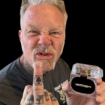One night this past October, Lars Ulrich was on his way to a Metallica video shoot when the thought suddenly occurred to him: He couldn't remember the arrangement for the new song that he was about to be filmed performing.
"We were doing the video for 'Halo on Fire,'" he tells Revolver, "and I realized that I had no fucking idea how the song we were about to do went!"
While haters and detractors might seize upon Ulrich's brain-fart as evidence of the 52 year-old Metallica drummer's advancing senility—and he might even jovially agree—this kind of thing can happen when your band slowly assembles an album over the course of two years, as Metallica did with their new full-length, Hardwired… to Self-Destruct.
"It's hard for me to have a complete picture of the album at this point," laughs Ulrich. "These interviews that you do between finishing the record and when it comes out, it's always like, 'Tell me about the record.' Well, I'm not really sure, yet! But the other night, when I listened to 'Halo on Fire' a few times in the car as I was driving over to Oakland to the video shoot—it sure sounded pretty fucking rockin' to me!"
If one was forced to sum up Hardwired… to Self-Destruct in just three words, "pretty fucking rockin'" would be a fairly accurate assessment. Metallica's first new studio album since 2008's Death Magnetic—unless you count their Lulu, their controversial 2011 collaboration with the late Lou Reed—Hardwired… to Self-Destruct (which is also the first album to be released on Blackened Recordings, the band's own label) finds Ulrich, vocalist/guitarist James Hetfield, lead guitarist Kirk Hammett and bassist Robert Trujillo blasting their way through 12 tracks that swing hard and riff even harder.
Unburdened by the sort of stylistic and sonic experiments that fueled (some would say marred) previous Metallica records like 1996's Load and 2003's St. Anger, Hardwired… to Self-Destruct often crosses the driving, visceral hard rock of 1991's Metallica (a.k.a. "The Black Album") with the back-to-thrash fury of the Rick Rubin-produced Death Magnetic — albeit with a sound that's more stripped-down than the former, and mercifully free of the latter's teeth-gritting digital harshness. In short, Hardwired… to Self-Destruct is the head-banging, life-affirming creation of four seasoned metal veterans doing what they do best in the recording studio.
"It's documenting exactly where we are right now," says Hetfield. "I don't want to compare it to previous stuff—that stuff is what it is, and this stuff is what it is." Still, Hetfield admits that he occasionally looked to the band's 1983 full-length debut as a touchstone during the writing and recording process. "Maybe the initial intention was 'simplicity'—I wanted more simplicity, so I kept saying, Kill 'Em All. The Black Album is more simple than some of the others, song-wise; but the production of that record is quite complex and really layered. I wanted the new one to have a little more layers than Death Magnetic, but I also wanted it to be more simple—and I wanted it to be more palatable to the ear. I think Death Magnetic is very, very powerful, and I love it, but it abuses the ear quite a bit. This record sounds loud and powerful, but in a warmer way."
Hetfield and Ulrich credit the album's beefy sonic attack to Greg Fidelman, who co-produced the album with them at the band's HQ in San Rafael, California. Fidelman has engineered every Metallica recording from Death Magnetic onward—and has also been behind the recording desk for Slayer, Slipknot, Black Sabbath, and many other rock and metal luminaries during his career, which has often involved serving as the engineer on Rick Rubin's productions.
"Since Greg walked into our lives in 2007, he's been on every project—Death Magnetic, Through the Never [the band's 2013 concert film], the Deep Purple, Rainbow and Iron Maiden covers we did, the Lou Reed record," Ulrich explains. "So I think by the time that Rick [Rubin] was not, uh, involved, he maybe felt a little freer to make Metallica sound the way that he felt it should sound."
"We really enjoyed his sonics and the approach he had on the movie," seconds Hetfield. "The Through the Never stuff sounds really, really warm and powerful, so it's easy to turn up. That's what we were going for this time, and Greg stepped up… I've gotta give him credit, because it's not easy to hang out with us," Hetfield laughs. "It can be pretty rough jumping into the mix between Lars and I. He did a good job of being the swing vote, or the referee, or whatever you want to call it. I mean, this guy is pretty mellow, and he's able to get his opinion across without being a dick about it. Not that you have to totally walk on eggshells around us, but I think Lars and I backed off quite a bit. There was a lot less… I wouldn't say arguments, but disagreements on how things should go, because we really trusted him."
In fact, to hear Metallica's co-founders tell it, the entire process of creating Hardwired… to Self-Destruct was remarkably smooth. "It was actually kind of the exact opposite of the Death Magnetic process," says Ulrich. "With that album, we met with Rick very early on; he would come up to Northern California every few weeks, and we'd sit around and listen to music and talk about our history, and about our future, who we were…
"It was deep stuff, and it was very cool and very interesting. Rick encouraged us to try this and try that; that you shouldn't be afraid to embrace your past, and that you could be inspired by previous work. So there was a very systematic and thought-out approach to what we were doing with that record. With this record, there were no meetings or concepts or anything. It was very organic. We just kind of fell into it."
According to Hetfield, the band first began thinking about making a new record in the spring of 2014, shortly after the release of their digital single, "The Lords of Summer." (A re-recorded version of the song is included on the deluxe three-disc edition of Hardwired… to Self-Destruct.) "We'd been very busy, and we'd definitely had some great adventures—we did the Orion Festivals, we made the movie, we played Antarctica," he remembers. "But it gets to the point where I'm feeling itchy, like we're spinning our wheels. Touring is great—but when you write, when you create, when you're doing that stuff, it makes me feel purposeful."
Once the band began gearing up to write some new material, Mike Gillies, Metallica's regular sound engineer, handed Ulrich an iPod. "It was full of all these ideas that have been floating around in soundchecks and rehearsals and tuning rooms," Ulrich says. "I think there was like 1,500 ideas, or something crazy like that. I spent a good portion of that summer listening to that iPod as I was driving, and when we got together in August or September of that year, I had picked out 30 or 40 of those riffs and ideas and things, the ones that seemed like they'd be cool songs, and off we went."
"Lars is really pretty good at being the riff judge," says Hetfield. "He's got a gift, in that he can feel the movement of it, and he knows how to string things together."
"There wasn't any sort of blueprint or goal about where we were going with this record," Ulrich continues. "We just wanted to write the best songs, and get on with it. It wasn't probably until half or three-quarters of the way through that we started to get the complete picture of what it was."
As the Hardwired songs started coming into focus, the band realized that many of them would benefit from some judicious pruning. "On the last record, we actually kept pushing the songs longer and longer," Ulrich explains "Rick was very encouraging of us making it crazier and weirder and longer and more psycho—'Make it more ridiculous,' he'd say. This time, we felt that some of the new material had kind of run amok; some of it had gotten too indulgent. We started shortening the songs, and making them leaner and tighter."
Indeed, while 11 of the album's 12 songs are over six minutes in length—and "Now That We're Dead," "Halo on Fire," "Here Comes Revenge," and "Spit Out the Bone" all clock in at seven or more—there's still a certain sense of economy to them; rather than shoe-horning as many parts as possible into each song, the band focuses on squeezing as much juice as they can out of a select handful of killer, muscular riffs.
"Part of the thing about keeping the songs shorter is that it's harder to remember all the parts when you're 50 than when you're 20," Ulrich laughs. "But you can have a four-minute song that seems like it never ends, or you can have an eight-minute song that seems like it's super-tight. Ultimately, whether it's great or not is the first criteria."
The one notable exception, length-wise, is "Hardwired," the album's bruising opening track. At 3:09, it's officially the second-shortest song in the entire Metallica catalog, just a hair longer than Kill 'Em All's "Motorbreath." The last song penned and recorded for the album, "Hardwired" came together surprisingly quickly. "In May or June of this year, I started trying to sequence the record and figure out how it was going to all flow together," Ulrich explains. "I told James and Greg that I didn't think he had an obvious opening song. So we talked about it and said, 'Let's see what happens if we just try to write one.'
"I think we wrote 'Hardwired' on Monday and Tuesday, and recorded it on Wednesday and Thursday, or something like that," Ulrich continues. "We were almost joking about it, like, 'Maybe there's the blueprint for the next record!' Maybe instead of writing 20 songs at a time, or having iPods with 1,800 riffs in them, we should just write one song at a time from beginning to end. Maybe let's write a song a week for 12 weeks. I don't know—it could be an interesting experiment!"
With its chorus cry of "We're so fucked/ Shit outta luck" and its bleak picture of a civilization consumed by paranoia, pain and insanity, "Hardwired" encapsulates the pessimistic worldview that courses through the album like a lava flow. ("Murder One," Hetfield's tribute to late Motörhead mainman Lemmy Kilmister, offers the only real respite from the relentless negativity.) Despite the darkness of his lyrics, however, Hetfield says he remains guardedly optimistic about the future of humanity.
"It's kind of fun to take a cynical look at the world and what's going on," he explains. "You can really get wound up and say, 'We're fucked!' But we're not; we're not fucked. Man has survived lots and lots of things, even though the elder generation is always saying, 'What a mess—you guys are screwed!' The amount of changes that we've seen in our lifetime is unprecedented; there's so much that's happened, and we're doing our best to adapt to it. You have to be accepting of things as they are—and see the adventure and possibility in it—rather than just sitting there fighting it."
Having already weathered 35 years of tumultuous existence—during a stretch that has witnessed a ridiculous amount of change in the music business, let alone the rest of the world—Hetfield and Metallica have more than proven their ability to adapt, survive and flourish. Love 'em or hate 'em, they're still the biggest metal band in the world; and given the rude vitality of Hardwired… to Self-Destruct, don't rule out the possibility of them continuing to rock for decades to come.
"I hope when we're 70 that James and I, we can still bring it," Ulrich says. "We'll have to see how it plays out, given the physicality of what we do. But so far, so good!"
"I don't see why not," says Hetfield. "When I look at the Rolling Stones, our songs and our live show are definitely a little more athletic than theirs, I'd say, but Mick Jagger still covers the stage at 70-something. But I like to compare us more to Angus Young and AC/DC. Angus blows my mind—he's up there giving it 110 percent every night, and I really admire the shit out of that. At the end of the day, if you're honestly having fun and you're doing it for yourself, there's no reason to stop."












